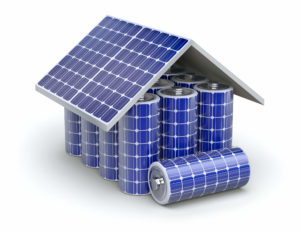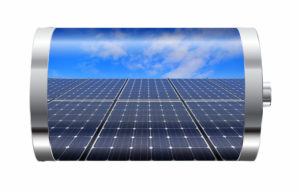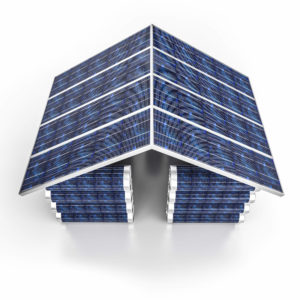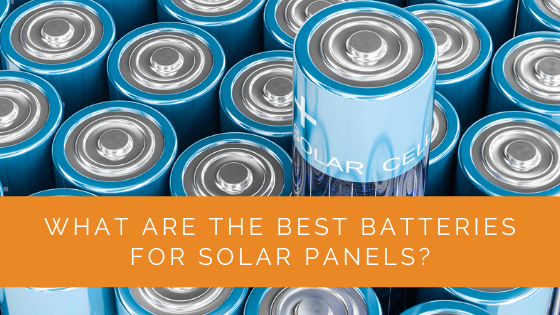Energy storage is of utmost importance when it comes to solar panel systems. You need to have dependable solar energy storage if you are to enjoy the benefits of solar energy.
A solar battery enables you to power your house with renewable solar energy at night and during the evening when solar PV panels cannot produce energy.
Solar panels transform solar energy into electricity and, in most cases, they generate more electricity than can be utilized. What’s more, having solar panel battery storage will help reduce your dependence on an energy service provider, taking your savings a notch higher.
Are you considering installing a new solar power system or exchanging your battery storage bank? Knowing what the best batteries for your solar panels are will assist you in making the right decision. Whether the solar power system is for your home, cabin, RV, or any setting, you may need stored power.
Here’s everything you need to know to help you choose the best solar batteries.
Contents
- 1 Key Takeaways
- 2 What Should I Compare for My Solar Storage Options?
- 3 How Long Do Solar Batteries Last?
- 4 What Are the Best Batteries for Solar?
- 5 Case Study: Selecting and Implementing Optimal Solar Battery Storage
- 6 Expert Insights From Our Solar Panel Installers About Choosing the Best Batteries for Solar Panels
- 7 Experience Solar Excellence with Us!
- 8 Conclusion
Key Takeaways
- Solar panel systems require dependable energy storage to utilize solar energy effectively, especially during nighttime or cloudy periods.
- When choosing the best batteries for your solar panels, consider factors like energy storage capacity, depth of discharge (DoD), round-trip efficiency, battery life, warranty, and the manufacturer’s reputation.
- Solar batteries typically last between 5 and 15 years, and proper maintenance and temperature control can extend their lifespan. The best battery type for your solar panels depends on your specific needs, with options including lead-acid, lithium-ion, and saltwater batteries.
What Should I Compare for My Solar Storage Options?
When reviewing your solar battery alternatives, there are some specs you should take into account, such as the amount of power it can give off or the lifespan of the solar battery.
These specs determine a durable battery that will last and end up with a flimsy one. Here are some of the specifications you should consider:

Capacity & Power
The battery’s energy storage capacity is the first thing you should consider when purchasing a solar battery. In this case, you should take into account both power and capacity rating.
It is essential to know how much power the battery can generate and how long it will last. For example, a battery with a high capacity and low power rating will only have the ability to power a limited number of appliances in your house, but for a prolonged period.
Conversely, if the battery has a high power rating and low capacity, it will power most of your electrical appliances, but for a short duration. So, it would be best if you went for a battery with a high power-rating and high capacity. With this type of battery cell, you can power several appliances at your house and for a prolonged period.
Depth of Discharge (DoD)
The majority of solar batteries retain a bit of charge at all times because of their chemical composition. If you utilize 100% of the charge, the battery’s shelf life will be significantly diminished.
A battery’s depth of discharge (DoD) refers to the battery’s capacity that has been utilized. The majority of manufacturers specify an optimum DoD for top performance.
For instance, if you have a 10kWh battery with a 90% DoD, you shouldn’t consume over 9kWh of the battery’s power before recharging. In general, if a battery has a higher DoD, it means you can get more out of your battery’s capacity.
Round-trip Efficiency
The round-trip efficiency of a battery is represented as a percentage of the amount of energy used and the amount it took to store it.
For instance, if 5 kWh of electricity is stored in the battery and you can only harness 3 kWh of usable electricity, then the battery has a 60% round-trip efficiency (3 kWh / 5 kWh = 60%).
In general, a high round-trip efficiency means you get a more cost-effective value from your battery.

Battery Life & Warranty
Battery life refers to the duration it will take before the battery loses its capability to hold a charge. In general, your battery will charge and drain every day, with the charge decreasing each time you use it.
You can measure your solar panel’s battery life in terms of years, days or hours, while the length depends on the capacity, type, or brand.
If you want a robust and long-lasting battery, you should be ready to splash the cash. In most cases, long-lasting batteries will be more expensive compared to less durable ones.
Furthermore, every brand has an estimated duration their batteries will stay useful. Make sure to review this before buying the solar cell. For this reason, it is integral that you have a manufacturer warranty that guarantees any malfunction will be sorted out.
The more extended the warranty, the good it is for you. Generally, expensive brands provide more prolonged warranties compared to cheap and less known ones. A reasonable warranty period ranges from 20-30 years.
Manufacturer
Various kinds of businesses, from tech startups to automotive companies, are developing and manufacturing solar batteries.
Although a big automotive company branching into the energy storage sector may have a long history of product manufacturing, they may not provide groundbreaking tech. On the other hand, a tech startup may have an innovative technology, but no track record proves the battery’s long-term functionality.
Choosing the battery manufacturer depends on what you are looking for. Reviewing the warranties related to each product can provide you with insight into the manufacturer to buy from.
How Long Do Solar Batteries Last?
There are two ways to answer this, and the first one is establishing the duration a solar battery can light up your place. In most circumstances, a fully charged battery can power your house at night when the solar panels aren’t generating any energy.
To have a more precise calculation, you’ll have to know a couple of variables, including the amount of energy your house uses on any given day, what the power rating and capacity are for your battery, and if you are connected to the grid.
For the sake of argument, we’ll try to establish the battery capacity required to provide sufficient solar and storage solution using the national average statistics from the U.S. Energy Information Administration.
On average, a household will consume 30 kWh of energy daily, while a solar battery can provide 10 kWh of capacity. Taking this into account, it means that if you bought three solar batteries, you could power your house during the day with only battery support.
In general, the useful lifespan of a solar battery ranges between 5 and 15 years. So if you were to install a solar battery now, you’d have to replace it at least once to match up with the lifespan of your solar PV system.
Given how solar panels’ shelf life has increased recently, it is anticipated that solar batteries will follow as the energy storage market continues to grow.
Proper maintenance also has a massive impact on the lifespan of your solar battery. Solar batteries are massively affected by temperature, so shielding your battery from sweltering or freezing temperatures can raise its shelf life. The quality of your maintenance efforts can undoubtedly affect the lifespan of your solar battery.

What Are the Best Batteries for Solar?
To select the best solar batteries suited for your solar panels, you need to understand the different classes of batteries.
Batteries typically comprise three chemical compositions: saltwater, lithium-ion, and lead-acid. Let’s have a look at them:
Lead-acid
These batteries are tried and tested and have been utilized for more than 150 years in off-grid energy systems. Although they have a relatively lower DoD and short lifespan compared to other battery types, they are very affordable and 99% recyclable.
Their design allows it to handle the daily charge cycling easily. The main benefits of these batteries include their reliability, low purchase cost, and safety. But these cells have some drawbacks.
These batteries give off a byproduct in the form of gas, so ventilation is crucial where they are situated. Another drawback is that they are corrosive and bulky. They also require regular maintenance checks and must be positioned in an upright manner to prevent leakage.
For those who want to be off the grid and need lots of energy storage, lead-acid can prove to be a viable option for you.
Lithium-ion
Most new home energy storage options utilize some form of lithium-ion technology. These cells have received massive traction in the renewable energy scene of late, given how they are more compact and lighter compared to lead-acid batteries.
Although lithium-ion batteries are costly compared to other battery types, lithium batteries provide numerous advantage that more than compensate for the price. Some of these benefits include no gas emission, more storage capacity, no maintenance, higher power usage efficiency, and a longer lifespan.
Saltwater
The saltwater battery is more of a newbie in the energy storage sector. Unlike other energy storage alternatives, these batteries don’t have any metals but rather depend on saltwater electrolytes. This means the battery can easily be recycled.
Case Study: Selecting and Implementing Optimal Solar Battery Storage
Background
Solar Panels Network USA recently partnered with a homeowner to enhance their existing solar panel system by selecting and installing the optimal battery storage solution. The homeowner had been experiencing fluctuations in energy availability, especially during nighttime and cloudy days, prompting the need for a reliable and efficient storage solution.
Project Overview
The objective was to identify the most suitable battery for the homeowner’s solar panel system, ensuring maximum efficiency, reliability, and cost-effectiveness. The homeowner’s energy needs, budget, and specific environmental conditions were all considered in the selection process.
Implementation
Initial Assessment Our team began by conducting a thorough assessment of the homeowner’s energy usage patterns and the performance of the existing solar panel system. We utilized historical data to understand peak usage times and identify any gaps in energy supply.
Battery Selection Criteria Based on the assessment, we established key criteria for selecting the best battery:
- Capacity and Power: We needed a battery that could store enough energy to power the household during peak usage times and extended periods of low sunlight.
- Depth of Discharge (DoD): A high DoD was crucial to ensure the battery’s longevity and efficiency.
- Round-trip Efficiency: To maximize the cost-effectiveness of the battery, a high round-trip efficiency was essential.
- Lifespan and Warranty: The battery needed to offer a long lifespan with a robust warranty to guarantee performance and reliability.
- Manufacturer Reputation: We considered manufacturers with a proven track record in the energy storage industry.
Battery Options Considered
- Lead-Acid Batteries: Known for their reliability and affordability, but they have a shorter lifespan and lower DoD compared to other types.
- Lithium-Ion Batteries: Offered high efficiency, longer lifespan, and minimal maintenance, but at a higher upfront cost.
- Saltwater Batteries: Environmentally friendly and easily recyclable, but relatively new and less proven in long-term performance.
Final Selection After a comprehensive evaluation, we recommended a lithium-ion battery. Despite the higher initial investment, its benefits in terms of efficiency, lifespan, and maintenance aligned perfectly with the homeowner’s needs and long-term goals.
Installation and Setup Our team proceeded with the installation, ensuring the battery was integrated seamlessly with the existing solar panel system. We followed best practices for installation, including:
- Ensuring the battery was placed in a temperature-controlled environment to prevent overheating or freezing.
- Configuring the battery management system for optimal performance and safety.
- Educating the homeowner on the battery’s maintenance and monitoring procedures.
Results
The installation of the lithium-ion battery significantly improved the homeowner’s energy storage capabilities. The system now provides a consistent and reliable power supply, even during periods of low sunlight. The homeowner reported:
- A 40% increase in energy availability during nighttime and cloudy days.
- Reduced reliance on grid electricity, leading to significant cost savings.
- Enhanced overall efficiency of the solar panel system.
Performance Metrics:
- Before Installation: Frequent power shortages during non-sunny days.
- After Installation: Continuous power supply with minimal interruptions.
Summary
Our project with this homeowner illustrates the critical importance of selecting the right battery for solar panel systems. By considering key factors such as capacity, DoD, efficiency, lifespan, and manufacturer reputation, we were able to recommend and install a lithium-ion battery that met the homeowner’s needs and enhanced the overall performance of their solar energy system.
At Solar Panels Network USA, we are dedicated to providing tailored solutions that maximize the efficiency and reliability of solar energy systems. Our expertise ensures that clients receive the best possible guidance and support, enabling them to make informed decisions and fully benefit from renewable energy.
Choosing the right battery for your solar panel system can significantly impact your energy independence and cost savings. Trust in our experience and commitment to excellence to help you find the best solution for your energy storage needs.
Expert Insights From Our Solar Panel Installers About Choosing the Best Batteries for Solar Panels
Choosing the right battery for your solar panel system is crucial. Factors such as capacity, power rating, and depth of discharge will determine how efficiently your system stores and uses energy.
Senior Solar Technician
Lithium-ion batteries are a popular choice due to their high efficiency and long lifespan. Despite their higher cost, they offer superior performance and minimal maintenance, making them ideal for residential solar systems.
Solar Energy Consultant
Proper maintenance and temperature control can significantly extend the lifespan of your solar batteries. Ensuring they are protected from extreme temperatures is key to maximizing their efficiency and longevity.
Renewable Energy Specialist
Experience Solar Excellence with Us!
Trust in Solar Panels Network USA, where our seasoned experts deliver top-quality solar solutions for homes and businesses nationwide. With a legacy of countless successful installations and a commitment to sustainable energy, we’re your reliable partner in the solar journey. Ready for a brighter, eco-friendly future? Call us now at (855) 427-0058 and harness the power of the sun!
Conclusion
Although there are an array of benefits that come with obtaining a battery system for your solar panel system, there are also numerous challenges in choosing the perfect ones suited for you.
Solar panel batteries are costly and difficult to replace after installation makes finding the best ones more daunting. The information provided above is sufficient to help you find the best batteries for your solar panel needs.
About the Author
Solar Panels Network USA stands at the forefront of solar energy solutions, driven by a team of seasoned solar engineers and energy consultants. With over decades of experience in delivering high-quality solar installations and maintenance, we are committed to promoting sustainable energy through customer-centric, tailored solutions. Our articles reflect this commitment, crafted collaboratively by experts to provide accurate, up-to-date insights into solar technology, ensuring our readers are well-informed and empowered in their solar energy decisions.

